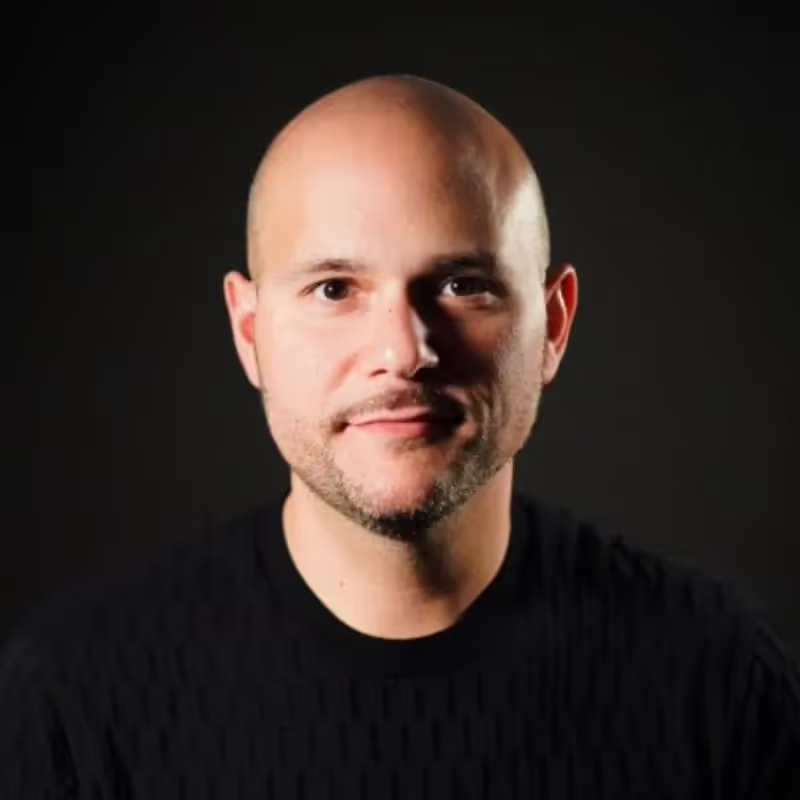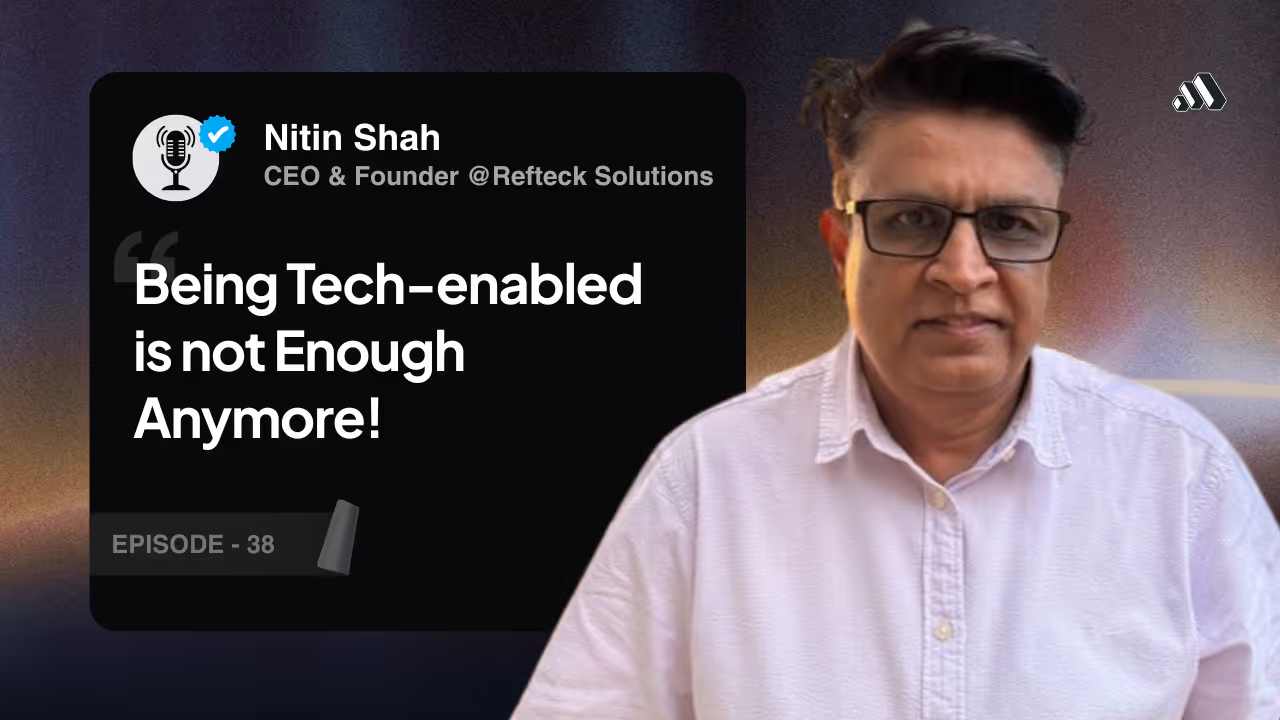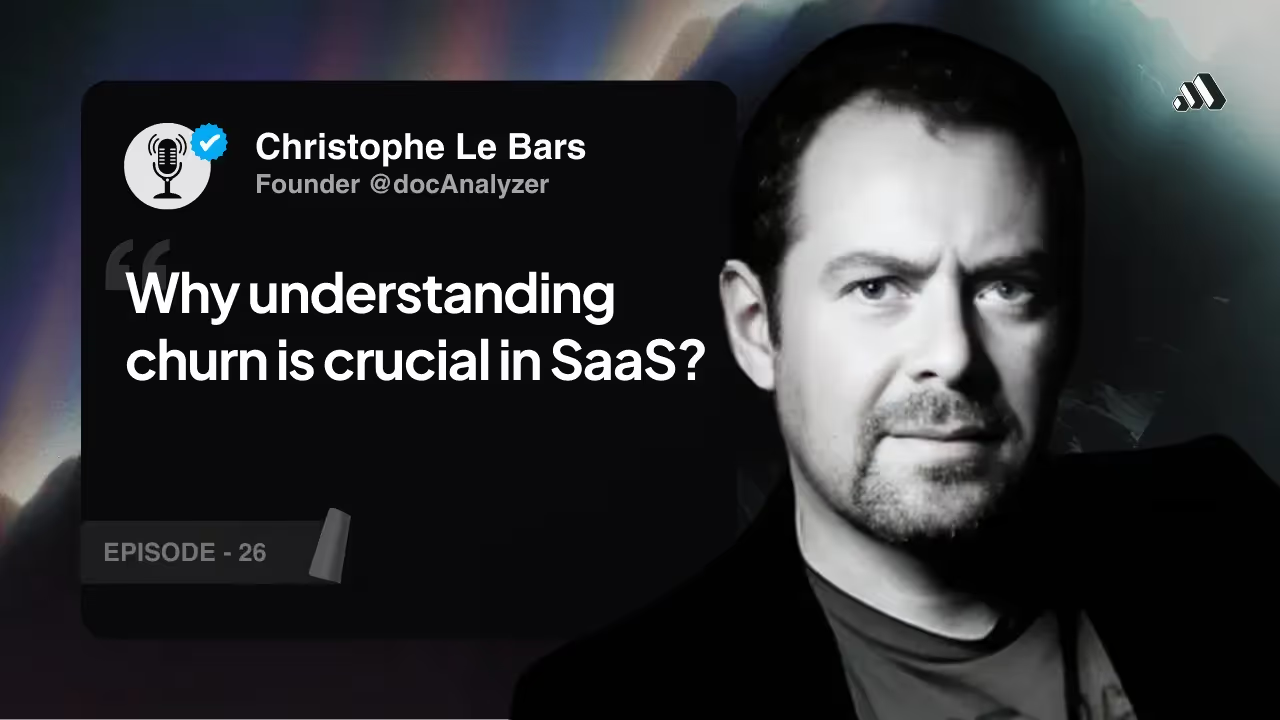Discover how a 3X founder is making an impact with Alphana
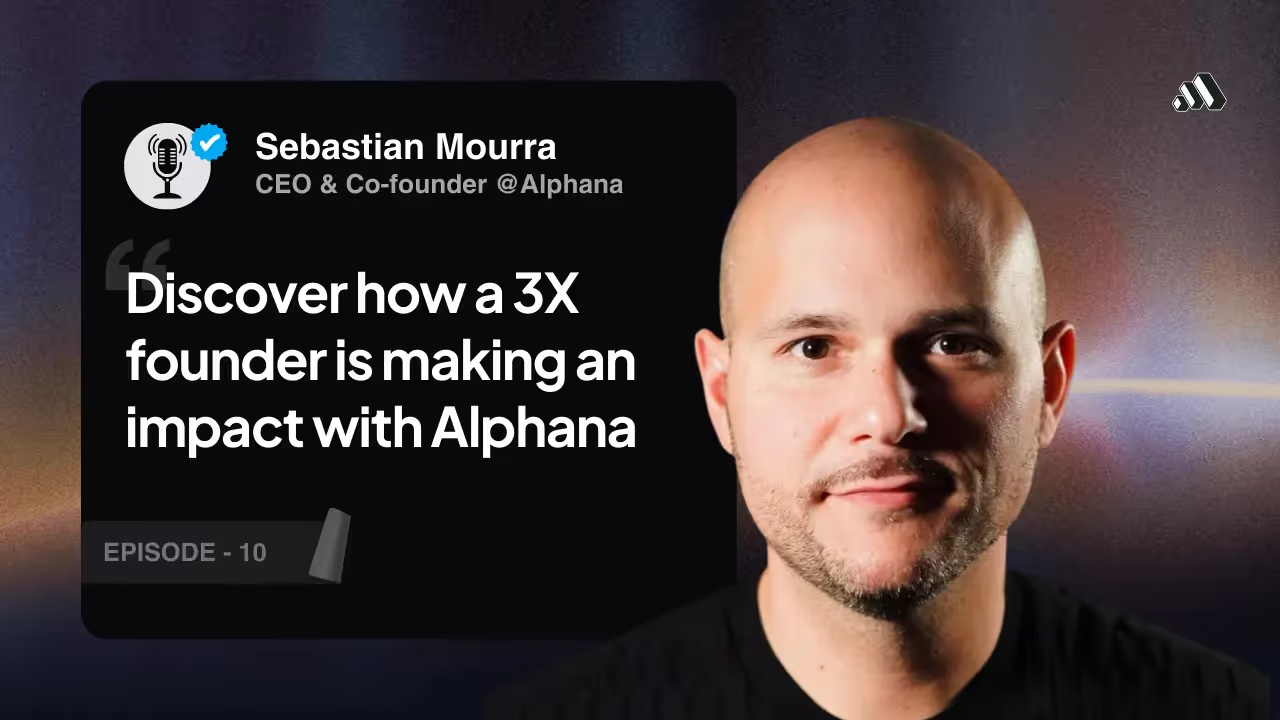



.avif)
Introduction
Sebastian from Alphana discusses how their platform helps content creators by converting their videos and podcasts into shareable content pieces. The goal is to allow creators to focus on their craft while Alphana handles the rest. Sebastian also shares his motivation for building a new company and the challenges and rewards of entrepreneurship. Alphana is still in the early stages with a small team, but they have already seen positive feedback and hundreds of users signing up. Sebastian emphasizes the importance of effectively communicating value to customers and tailoring the messaging to their specific needs.
"Building a business is like chewing glass."
- Sebastian Mourra
Key Takeaways
- Alphana converts videos and podcasts into shareable content pieces, allowing creators to focus on their craft.
- Sebastian's motivation for building a new company stems from his entrepreneurial background and the desire to solve challenges for others.
- Alphana is still in the early stages but has received positive feedback and hundreds of sign-ups.
- Effectively communicating value to customers is crucial, and tailoring the messaging to their specific needs is key.
- Sebastian highlights the importance of constantly learning from customers and incorporating their feedback into the product.
Transcript
Yash From Momentum (00:00)
Hello and welcome back to Building Momentum, the show where we peel back the curtain on the exciting and often chaotic world of building a successful SaaS business. I'm Yash, your host for this show, where every episode we bring to you the stories and strategies of founders who've been in the trenches, conquering churns, scaling their team, and building products that people and businesses love. In this episode, we'll be chatting with Sebastian from Alphana. Alphana converts your videos, podcasts, and ideas into 30 plus shareable content pieces like articles, social posts, concise
We're excited to hear this story and the lessons they've learned along the way. We'll be dissecting the wins, the losses, and everything in between. So buckle up, grab your headphones, and get ready to dive into the world of SaaS. Hey, Sebastian, how are you doing today?
Sebastian Mourra (00:40)
I'm doing well. It's beautiful out here today. How about you, Yash?
Yash From Momentum (00:44)
I'm doing great as well. Where are you based? awesome. Great to know. So let's start with the basics. So tell us what is the big bad problem that people and businesses have as on date that you are solving with Alphana.
Sebastian Mourra (00:46)
Yeah, so I'm in Miami, Florida.
Yeah, you know, it's always an interesting question. So I guess it kind of goes back into a little bit of context. I've worked with hundreds of creators, founders, marketers in my past from running an agency to working at Universal Music and all of that. And one of the things that's so consistent across all of them, I've seen them struggle with like, all right, you know, what do I need to do from a content strategy? What do I create? Where do I post? How do I make enough content? But I've got all this other stuff I need to do, right? It's like the typical even
a founder challenge, right? And what I saw was that they were just overwhelmed by it. And I think with AI and looking at, you know, how a business could truly grow, we wanted to let them focus on what they love and just let Alphana handle the rest. So if you could just focus on what you do best, let Alphana do the rest. That's where our ultimate vision is. You can focus on your craft.
Yash From Momentum (01:49)
So if I'm a video creator or a content creator or podcaster, I essentially do what I love best, which is to have conversations or create videos or create content. And then Alphana can do a great job of figuring out converting that into different forms of content that are appropriate for the platform that it is being posted on. Would that be a fair way to summarize?
Sebastian Mourra (02:09)
100 % because if you think about once you shoot that piece of content, the work doesn't stop there. It's like you want people to see it, to hear it, to watch it. And there's a whole set of work that needs to happen. But, you know, you're already moving on to the next thing. So how do we take that off your plate as much as possible until one day it could be fully autonomous?
Yash From Momentum (02:15)
Yeah.
Interesting. And that's really meaningful as well. So one of the guests that we had earlier on the show was Philip, who's building a company called Maker Suite, which sort of helps you with everything that happens pre -creation of the content. So it is essentially SEMrush for video creators and content creators. So the way SEMrush helps you figure out what blogs to write, what content gaps exist, what keywords to include and stuff like that.
they help you figure out what videos to create, what titles are people searching, and stuff like that. So I think there's a huge role that AI has to play in figuring out what to talk about. And then once you've spoken about it, figuring out how and where to distribute. So in that, in the content creation chain, value chain, I think, think AI plays a big role. And so one of the things that you mentioned was also the fact
that you had a couple of exits before, I think with Zeki and with Razz interactive as well. So it's a simple question, right? Why not just chill? Why go through the grind of building everything from scratch? Why do that?
Sebastian Mourra (03:36)
You know, I asked myself that question. like, why, in Florida, yeah, I mean, I just be hanging out by the beach, getting my tides, right? Yeah, it's always a question. Building a company is never easy, but I've kind of grew up with entrepreneurship. know, my dad, my parents, they've always had businesses. I've
Yash From Momentum (03:37)
and here in Florida as well, right, so it is a kind of beaches, yeah.
Yeah.
Sebastian Mourra (03:56)
I've seen business go successful. I've seen them fail and start a 100 percent from scratch. And it's like these constant ups and downs. So I think I kind of grew up in that environment. I really enjoy building businesses. You know, when we got acquired, we got acquired, we were working at the company for about two years. During that time we got acquired again. So it was like another exit happening at the same time. But you know, there was just something that's like,
just itch that you want to scratch. like, you know, it was time to go. I left, kind of took some time, tried to figure out like, you know, what you want to do. And it's like, when you see challenges happening and you hear from different people, what's going on, like I can't help but to want to help them and figure out a solution to it and go out and build, you know, and, you know, we did it. And, you know, during this process, I mean, it's who says, Elon Musk says that, you know, being an entrepreneur or building a business is
Yash From Momentum (04:37)
Yeah.
Sebastian Mourra (04:46)
chewing glass, right? It's it or running a startup and it and it really is and it's like you could take that time, but you shouldn't go off and just try to start a company because you want to like you've got to have you've got to you've got to really want to and you've got to be really connected to the problem that you are trying to solve and the people that you're trying to serve. Because if not, you're you're nothing else that's going to go motivate
Yash From Momentum (04:47)
Yeah.
Yeah. Yeah.
Sebastian Mourra (05:08)
Right? There's your friends, everybody else, like some might be the hype, but a lot of them are just going to be like, well, why are you know, it's most people aren't made for it. So you really have to believe in what you want to do and the problems that you want to solve and the people that you want to help in order for you to keep going. Cause that's what drives you inside. You know what I mean?
Yash From Momentum (05:27)
Fair point. And so this is like very, so I understand the itch that you're talking about as well, about building something valuable, building something that solves other people's problems and the joy that you feel when there's some urgent, important, frequent problem that exists in someone's life, you've sort of taken that away.
And seeing that and talking to those people, it's great to do that. so then, so with Alphana, can you give us a sense of the size and scale of the product? Where is it today? How many people are using it? If you could talk a little about
Sebastian Mourra (06:04)
Sure, you know, we're we're still early stage. We started off, we're bootstrapped founders putting in money. You know, we had two angels that were just so believed in it that, you know, we brought them in. for the most part, a bootstrap company is how we've been set up. And, you know, we bootstrapped our last businesses as well and built them from scratch. I think with this with this one's a little bit different because we see the potential on on where to go. We're a small team, two of us as co -founders.
Yash From Momentum (06:18)
Now.
Sebastian Mourra (06:30)
and we have, two developers as well. So we all work together, just like, really small team, but nimble fast. And, know, what I would say is probably the best in the industry. You know, my co -founders, like, like creative by nature, archetype, know, studied architecture. She's, led design at our agency done thousands of whether web product UX type of experiences. And so.
She brings a lot of that user centric design to what we do. And from what we see and what people talk about, like that's something that helps to differentiate. know, when you can have a partner like that to work together along with your engineering team to all get together and come together to solve a problem, that's where you can really truly create a beautiful experience. And so, yeah, small team. You know, I would say, you know, just in the last about week and a half,
Yash From Momentum (06:59)
Mm -hmm.
Sebastian Mourra (07:19)
You know, we've had hundreds of users just sign up and using the product. And so we are interacting with them almost every day. It's, it's actually incredible to see. So we're still very early in our journey, but from what we see, this is for us, we're in this for the decade. That's, that's the way that we take a look at
Yash From Momentum (07:23)
Mm -hmm. That was
Yeah, nice and interesting to hear that. By the way, my co -founder, Koushik, he also looks, he is also our head of design and he also studied architecture. So yeah, so he did, so he practiced architecture in the US, moved back to India and then we, he was part of the ClientJoy team and then we sort
Sebastian Mourra (07:48)
No way.
Yash From Momentum (07:58)
really like working together and started working on designs and on for the web form factor.
Sebastian Mourra (08:04)
You
I mean, you might agree, but like their minds work differently. You you you kind of like you you might see something one way. And once you have a conversation with them, it's all of a sudden, it's like, wow, OK, you're yeah, let's let's take that step back. Let's let's take a look at that. And that's always great to have. I don't know if you've experienced the same way, but it's incredible.
Yash From Momentum (08:16)
Yeah, yeah, yeah.
That happens very, very often. So I used to think that know how to. I'm not a UI UX designer, but I generally, just looking at a lot of different SaaS products, that's sort of my job. I do that all day in and day out. And so I thought that I have a good idea of how to present some information, how to design a journey, and stuff like
More often than not, he comes up with an approach that's not part of playbooks that you typically see. And those approaches tend to test better, work better. And I think this, I don't really know why or how. I'm just lucky I have it. I'm glad to know that you have that as well as your co -founder. So that's great to have. Another thing that we'd love to understand. So Alphana is a SaaS product that's self -serve.
expected to discover it themselves, sign up, use it, like it, and then pay for it themselves. More often than not, self -serve SaaS, much like Alphana, would expect people to have the whole journey by themselves with little to no human intervention of any sort. I noticed on your website, though, you have a book demo. Why do that? Why have
Book a demo because even if you close a customer for, I think, for let's say $30 a month, it's like $350 annually, which is, the economics won't sit. So you typically have Book a demo, get in touch with our sales team or something like that for an enterprise SaaS, which goes for like $20 ,000 a year or something like that. So why have that on the site?
Sebastian Mourra (09:54)
Yeah, it's a great question. So we added that to the site and because I want to talk to more people, right? The more that I could have interactions with those that need or use our product, the better it is for us as a company because that gives us the edge in how we take the product to where it is to go. And that's how I've been able to meet so many people. And what I've noticed is that those that booked a demo are ones that have
been, you know, like they've gone through a rough patch with previous software providers, and they really want to see what's going on. And they really want to dive deeper into it, which helps me get more insight to what they're doing on a day to day basis. And those calls are, you know, even though we do, I'll do a demo if it comes up, but sometimes I'm just learning on what are they doing today?
Yash From Momentum (10:35)
Yeah.
Sebastian Mourra (10:44)
You know, I got to go here. I got to grab this video and then I got to log into this software and I got to do this. And then I open up a spreadsheet or a notion and I do this. What I am doing is looking at, well, how do I ensure that you never have to do that again so that I can come back to my team, to my co -founder, to my engineering team, so we can figure out a way to help customers like that.
Yash From Momentum (10:52)
Yeah.
Sebastian Mourra (11:06)
And not everybody books. you if you get hundreds, mean, I'm, hundreds of people are not booking on that link, right? Everybody is going completely through self -serve, but it also gives me an opportunity. Even if I take a look at somebody who's enterprise, right? That might come through. You don't know what potential opportunities might come through there. And so I leave it there as a way for me to be able to interact with those who really want to take advantage. and I can get insight and I can in turn help them with what they're trying to accomplish.
Yash From Momentum (11:22)
Yeah.
Understood. essentially trying to have as many conversations as possible with people who are interested in using Alphana in some way, shape or form. But here's another question that I've always had with products in this category. And this is interesting because for the last decade or so, probably even more,
generic any SaaS product was divided into three categories. So you had systems of record, which are your CRM, CRPs, emails, and stuff like that. And then you had systems of engagement, is your Slack and customer support and stuff like that, which helps you engage with your stakeholders, employees, team members, or customers, investors, whatever the case may be. And then you had systems of intelligence, which is you have like.
Tableau Power BI, and all of those, which help you make better decisions. And so with AI, however, there's a new category that has come up, which is systems of outcomes, which I think Alphana falls in. So I go in, then I put in some data, and then it gives me some outcome, which is what most AI products are also. So chat, GPT, Gemini, all of these are systems of outcomes.
And one of the major challenges that a system of outcomes faces is that a customer will stay with Alphana.
only until Alphana is the best there is out there. Because there's no data within Alphana that keeps me glued to the system. So if I'm using Salesforce as my CRM, and I've used it for a year or so, so much amount of data is there in the system that it makes the churn very unlikely. I'll not be able to move out of it. Same for emails, similar for Slack, similar for all of those platforms. And all of my
it is just difficult to move out. But with systems of outcomes, what are the things that you plan to do or you already thought about to make sure that people do not churn away and they stay and so like, what are your thoughts around that?
Sebastian Mourra (13:27)
Yeah, I love that the way you framed it as system of outcomes, because it's always, sometimes it's hard to be able to explain on those areas. The whole point of Alphana on where we're going, we started in this area of helping others to able to generate content. We're automating those workflows. We also made it so flexible so that when something new happens in a month, a new trend in three months, you can actually recustomize the entire workflow almost like Lego blocks.
Right. that, that those are one of the things. So, and you know, when I talk to people and I'm seeing some people put review videos, they're like, wow, this is actually the most flexible platform I've ever used, which is, you know, it's one of those things where you get to see like from your customers, how they talk about your product. And so I think number one, we built that in advance because we knew that this was going to change constantly, right? Like every month. And it's great because you
Yash From Momentum (14:09)
Yeah.
Sebastian Mourra (14:18)
Just a couple of days ago, something happened. can go in, boom, boom, boom. It's up. Everybody's got now like, it's just that, that type of thing. But the second piece is kind of where we're going in order for this to become. so our vision ultimately is that the entire process is autonomous, right? It works for you. You put in what the necessary outcome that you're looking for and we can go to work for you. And so let me give you an example. Just imagine one day you do come in and you're like, Hey, I'm a content creator. I'm trying to quit my job.
And this is a real scenario, right? They're working, they work two jobs during the day, but they love to create music. They're trying to get out of that. So they're trying to figure out how they can make money on the side in order to get their business going. And so in this case, it's like, well, how much do you need to be able to quit your job, both jobs full time? And for example, let's say it's $5 ,000 a month. Well, fantastic. Making this your system to be able to put in that information and for
Alphana to be able to create the content strategy to be able to drive the business that you need in order for you to make at minimum 5 ,000. And obviously we want to be able to 10 X that, right? How do we get you to now make 10, a 100 K a month on how it is because in the end it's about the outcome. If you're creating this content and you're trying to put stuff out there in the end, you're for most people, it's a business and it's either going to help drive more business to your core business. Maybe you own a SaaS company.
maybe your, whatever it is or your software, whatever it is, is going to be that top of funnel leads that's going to come through. But still you have an outcome that you need to do. You got to deliver revenue for your company or you're trying to quit your job and start to full time so that you can just go do your passion, which is music. And so, you know, in the long run, that's what makes the stickiness is that eventually you can be able to operate and to be able to get to those types of outcomes versus
I just need a 100 views or I just need a blog post. Like that's not what you're coming to Alphana for, even though it's here now, but every company starts somewhere, right? But it's where it evolves to. And that's what we're really, we have our eye
Yash From Momentum (16:08)
Yeah.
That's so refreshing to hear. And I'll tell you why, Sebastian, because when this is a conversation that happens with any other SaaS product, and this is how one of the really bigger mistakes that we also committed. ClientJoy was our own SaaS product which
which we grew to about 13 ,000 customers, 90 plus countries. And it was a CRM for freelancers and agencies. And our whole retention strategy for the first three years of our existence, we exited after four years, we got acquired by a US based company. But our whole, thank you, but our whole retention strategy for the first three years of our existence was that, we'll have so much of the customer data that...
Sebastian Mourra (16:49)
Congrats.
Yash From Momentum (16:59)
they will be forced to stick with us. And that's just a very poor way to look at it. In hindsight, I now realize that. And it's so refreshing to hear you say that, hey, if we help our customers accomplish their goals and just tie ourselves with what they want to do, then this question itself sort of becomes a little irrelevant.
That's a good way to think about it. Another thing that I, yeah, and so thank you for thinking about it that way, because most SaaS founders don't. And this is something that I encourage every up and coming SaaS founder to do. The other thing that I want to understand is that for a platform like Alphana, I podcasters, video creators, content creators, are a couple of different ideal clients that you can go after. And to go after them, there are
Sebastian Mourra (17:23)
Thank
Yash From Momentum (17:47)
at least 10 different distribution channels that you can use. So you can use SEO, can use paid marketing, email, outbound, stuff like that. How do you decide? So one, what are the current channels that you are doing for Alphana? And how do you decide which ones to try first? And what are your thoughts around that?
Sebastian Mourra (18:06)
Yeah, no, that's a great point. The ones that we initially focused on was where we saw a lot of opportunity for other podcast creators or video creators. like, let's just call them video creators for a second, right? Whether you host a podcast with video, you're on YouTube, any one of those. And what we saw was they would focus on one channel and a lot of others don't
Like for example, those is one podcast show that we worked with that they, they, they thought Instagram and Tik TOK just doesn't work, right? It didn't work for them. doesn't bring them more views to their channel or anything like that. And they were just looking at it completely wrong. and they were also only focused on the video content, but they didn't focus on like text content, right? You know, people, not everyone watches video all the time, but video is extremely important and ha and short form is where you can drive a massive amount of top, top funnel.
But if you could just click a button and easily now reach an entire portion of an audience that was never gonna watch your content to begin with, why not? And so, we started taking the top channels we focused on. We have LinkedIn, Twitter, X threads, Instagram, TikTok, YouTube obviously was number one. That was like the first top, right? As the initial input and generate.
Yash From Momentum (19:02)
Yeah.
Yeah.
Sebastian Mourra (19:15)
those were the main ones, including blog newsletter. Like we just saw, like, if you're going to create a comprehensive marketing strategy and you didn't know what to do, if you click the button, it did it for you. And now, eventually it'll distribute it. But for now, you can now just go copy paste and place it. Your blog post, your newsletter, your titles and descriptions and meta tags, everything for you need for your video. here's some YouTube shorts and Instagram clips that you can share on those social networks. Cause we actually find those clips for you.
Yash From Momentum (19:30)
Yeah.
Sebastian Mourra (19:41)
And we're getting, getting good feedback that it's finding like great clips. Actually, I have to tell you this because I had one, which was amazing. They sent me a screenshot. Um, they literally opened up Alphana to test it. They put a video in there and extracted a clip. They posted that to YouTube and it already has almost a thousand views within 24 hours. They've never had a thousand views on a video before. And it's because it found the right moment. And, and, and I think that's what's important is like, you know, focus on the channels that can really bring results.
Yash From Momentum (19:58)
Yeah. Yeah. Yeah.
Mm -hmm.
Sebastian Mourra (20:10)
Just because you come in here, you don't need to use every single channel. That's why we made it flexible. We have one person who's like, I only do YouTube. I just want my YouTube video and I just want my YouTube shorts. And then I want to send out an email to everybody so they can go watch my YouTube video and maybe I'll post. Great. Boom. Click, click. Here's your workflow. That is all that it will produce for you. But if you just click this template, it'll automatically provide the rest. But that's OK, because every person.
Yash From Momentum (20:23)
Just let me out.
Yeah. Yeah. Yeah.
Sebastian Mourra (20:35)
right? And every individual, and that's what I've learned, is that everyone has their preferences on how they do things. But what we were talking about earlier, as long as we can get you to that outcome, that's what's really important, right? It's just like when you hire a whole team and you dictate exactly how they have to do everything, but in the end, it's on the outcome. So if you do things a little bit differently, but you're able to get us to our goal, fantastic, right? That's where you should be able to, that's where you should measure success.
Yash From Momentum (20:52)
Yeah. Yeah.
Yeah, that's great way to put it. I think so for all the people who are listening or watching, Sebastian mentioned a couple of times the workflow. I think from this conversation, you might not be able to grasp as to what that workflow helps you do or the template creation helps you do. So I strongly recommend this will be.
linking Alphana in the Wherever you are like Spotify YouTube Amazon music wherever you are will be linking Alphana in the in the description you can this is a great I think 50 second video on the website and I'd encourage you to check out and you'd be able to understand how simple is it right so just moving blocks the Lego piece that Sebastian mentioned it's it's really simple. It's extremely simple to do Check that out as
So Sebastian, that brings us to the last part of this conversation, which is where we ask founder questions. So one of the questions that our previous guest, who was Marek from Context Minds, he is building a platform that is a category creator. So a category like that doesn't exist. It helps you plan and organize your content using AI. And so it's sort of a mixture of SEMrush plus Amiro and a couple of other tools and platforms.
like SpyFu and so on and so forth in one single place. And one of the challenges that he's currently trying to solve for for context minds, is how do you make sure that you're effectively communicating value to your customers, right? Whether it's on your website or in your emails or wherever you are, how do you make sure, like what's the process that you go through to make sure you're effectively communicating
Sebastian Mourra (22:34)
Yeah, that's a great question, which kind of coincides with positioning as well, right? One is you've got one area where you want to make sure you're communicating to your customers the way that they see the value, because some see value a little bit differently, right? And so there's that initial learning phase. So for example, when we hear from our customers, wow, this is my favorite, what I love to do, or wow, I can
you know, I can't believe I can do this, this helped me achieve X. I then will take that terminology and repeat it right back to them and to others because I write if you start seeing something repetitive, that means potentially others probably will resonate the same well, same way. And and it's always a challenge because I think sometimes people forget what that value is. And so you want to be able to plug that into your different channels, whether that's in your email, whether it's in the copy on your website. Right.
Yash From Momentum (23:07)
Yeah. Yeah.
Sebastian Mourra (23:21)
Like don't just list features, right? And we are all guilty of this, myself included. Don't just list the features. Like you really got to focus on the benefits and, and what it can do for them and start plugging it in. So what you've learned from your customers, like if one customer is like, wow, this is like, you know, I don't know, like the most flexible whatever, and help me do XYZ repeat that again to you in the website copy and on all these different channels. I also take advantage of like, if people ask questions,
Yash From Momentum (23:26)
Yeah.
Yeah.
Yeah.
Sebastian Mourra (23:49)
let's say in chat, like not only answer the question, but try to throw in a one -liner about the value of what it does. You're right. You can do that. Like right back on your responses in your chat, in your email. Another spot that I see a lot of visibility is a knowledge base, right? People will go into the knowledge base to figure out how to do something, but not only do they learn how to do something, they're also realizing, wow. Wait, actually I can use this to, you know, get another thousand views on my video, or I could probably make another thousand dollars a month
Yash From Momentum (23:56)
Hmm.
Sebastian Mourra (24:16)
if I do XYZ, if that's what your tool does. So try to add that value in the places that your customers might live already. And so you've got your channels, like your chat, your knowledge base, your website, and just keep that as like constant, you know? And so that would be my recommendation. First, understand what they're saying already so you can take that language and then give it right back to
Yash From Momentum (24:31)
Yeah.
Interesting. so one of the things that we also used to try to do at ClientJoy was identify where does the SaaS falls. Are you helping them save time, save money, or help them make more money? So out of these three categories, we identified where do we fall. And then over there, what are the typical metrics that they care about? And so try and figure out.
How can you bring that into your statements as well? But this is great, right? So think of every opportunity where your customer is going to interact with any of the assets that you have, whether it is health particles or drip campaigns or, of course, the website and stuff like that. think of all of those as points where you can communicate value, including the support chat. So that's great. So what's the question that you have, the problem or an open?
that you're having with yourself, trying to figure out what to do next, that I should ask our next guest.
Sebastian Mourra (25:30)
You know, I don't know if I have the perfect question, but the one question I'm always curious and I'd love just seeing people's stories because it's always different. Everyone has a different way of doing it is the path to their first million in revenue as a company. What was it that they did and the pain and the good, the bad and the ugly in order to get to the first million in revenue?
because for every company that that's always going to be a challenge because at that time you're still figuring out product market fit. but to break it down as actionable as they can, right? What, what were the steps? What, what did they, what did they do? What really worked for them and what should people stay away from? So I would throw that as a question. It's always fun to hear, and see what others are doing at, those stages. Cause it helps to spark other ideas that, you know, maybe you knew and you just forgot
Yash From Momentum (25:56)
Yeah.
Yeah
Sebastian Mourra (26:18)
something you never thought of before, which those are always the best, right? You never thought of it before. so yeah, I, I throw that for the next.
Yash From Momentum (26:20)
Yeah, yeah, yeah. Very interesting. So for our first, like very short, for our first million in revenue, almost nothing worked. But there was a few couple of things that worked and that worked really well. think in our case, was just luck that we were able to land on to a particular.
channel that worked for ourselves significantly better. We've documented that as a part of the blog, which we'll also link that. Over here, it's like a 4 ,000 word article on what work, what didn't. So I'll not go into that. But great question. I'll make sure I'll ask our next guest that. And with that, Sebastian, I would love to thank you for joining in and having this conversation. And for all the people, as I shared with you, who are listening or watching this, we've linked.
We've linked Alphana into the description, wherever you are. Please go ahead, check it out. It'll help you create content pieces, like 30 plus content pieces for your ideas, for your video, for your podcast. That should be helpful as well. Thanks. Thanks, Sebastian, again.
Sebastian Mourra (27:24)
Thank you so much.
The inbox update you’ll never want to skip
A quick catch-up with ideas, wins, and tips worth stealing, straight to your inbox every week.
The easiest way to reach us.
Share your details and we’ll get back within 24 hours.
Podcast
A plethora of insights,all in one place
From strategy to execution. All the big ideas, practical guides & fresh perspectives that’ll help you scale with confidence
Ebooks
Comprehensive guides that break down the shifts in business and technology, Helping you lead with clarity.
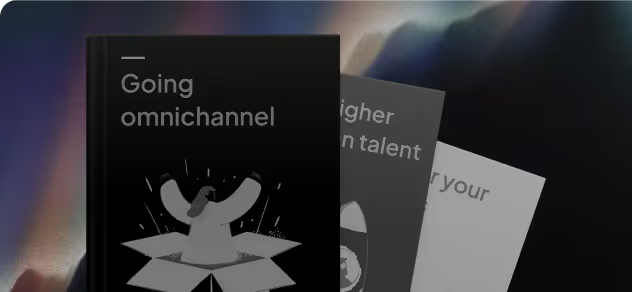
Office Hours
Your direct line to our experts. Practical advice for scaling, right when you need it.
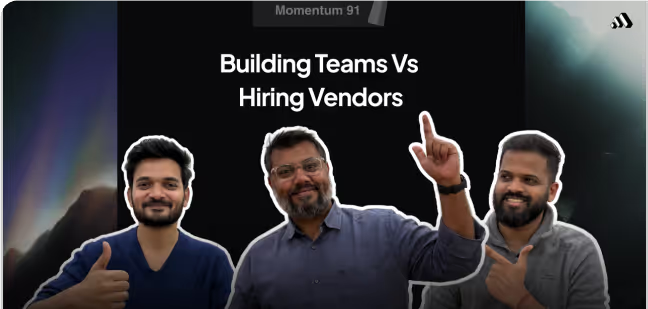
Reports
Data-backed perspectives on where industries are headed, giving you the foresight to make bolder moves.
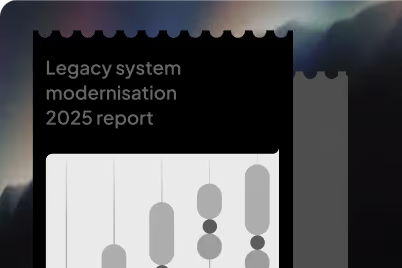
Newsletter
A quick catch-up with ideas, wins, and tips worth stealing, straight to your inbox every week.
.avif)
Podcasts
Conversations where you get to know everything from the ones who know it best.
.avif)
Your Offshore Development Center, Done Right
Access top-tier global talent, enterprise infrastructure, and complete regulatory compliance through our proven model.
Start Now

